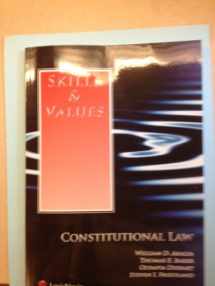
Skills & Values: Constitutional Law (Skills & Values Series)
Book details
Summary
Description
Each chapter begins with a summary of the underlying doctrine the student will be expected to know and apply in the problem. (Links to Lexis versions of the full texts of the cases and materials cited in each introductory summary, as well as links to additional helpful sources, are provided online, in a manner the professor can make accessible to her students if she chooses.) It then presents the problem, which usually includes significant primary materials the student will be expected to mine for legally relevant content. The assignments are explained clearly, and time expectations (based on the assignment's difficulty) are provided.
Two aspects of these problems stand out for professors seeking to prepare their students for modern practice realities. First, the assignments require students to work in groups of varying size. This feature responds to the reality that legal work is usually done collegially. Too often law school downplays the role of group work; these problems encourage it.
Second, several assignments include ethics components, which require students to consider how their choices about performing the assigned tasks implicate ethical issues. This feature reflects the authors' focus on ensuring that students get this sort of ethical training, and that they get it in the context of substantive learning rather than solely as a stand-alone class in legal ethics.
The real-world nature of the problems presented, the requirement of collegial problem-solving, and the focus on ethics that together characterize this book respond to recent critiques of legal education, such as those in the 2007 Carnegie Report. They also respond to student concerns and desires to learn law in a manner relevant to their career goals, through group-learning activities of the sort that likely marked their undergraduate education, and with a consistent focus on the ethical practice of law.


We would LOVE it if you could help us and other readers by reviewing the book
Book review



